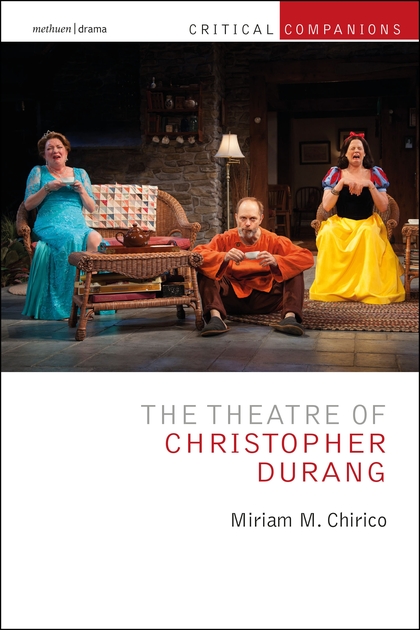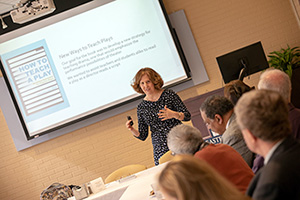- Apply
- Visit
- Request Info
- Give



Published on June 09, 2020
 Miriam Chirico, English Professor at Eastern Connecticut State University, authored a new book, “The Theatre of Christopher Durang,” published by Bloomsbury Publishers. This release follows the January 2020 publication of “How to Teach a Play: Essential Exercises for Popular Plays,” which Chirico co-edited.
Miriam Chirico, English Professor at Eastern Connecticut State University, authored a new book, “The Theatre of Christopher Durang,” published by Bloomsbury Publishers. This release follows the January 2020 publication of “How to Teach a Play: Essential Exercises for Popular Plays,” which Chirico co-edited.
In describing Chirico’s latest book, Bloomsbury notes: “This volume provides the first comprehensive examination of [the contemporary comedic playwright’s] works and incorporates comedic theory to examine how laughter in performance subverts social conventions and hierarchies. Through a clear, detailed discussion of the plays, Miriam Chirico considers Durang’s use of black comedy, satire and parody to explode such topics as Western literature, religion, dysfunctional families and American social malaise.”
Teaching and scholarship, among other obligations, is an exercise in self-discipline, but Chirico enjoys the challenge of this demanding work and focusing her creative energy. She produced “The Theatre of Christopher Durang” over a three-year period during the summer months, when she could spend long periods of time reading Durang’s plays and writing about them analytically.

“Christopher Durang is a major contemporary American playwright who has defined comedy for the American stage for over 40 years,” said Chirico. “His most visible work, ‘Sister Mary Ignatius Explains it All to You’ (1979), incited protests because of its portrayal of Catholicism and challenged the rights to free speech, while his Tony Award-winning play, ‘Vanya, Sonia, Masha and Spike’ (2012) offers a light-hearted rift on Chekhovian themes.
“In between these two moments, he has written more than 20 plays noted for attacking conservative religious beliefs, vacuous 24-hour media feeds, patriarchal government control, rosy images of the TV-perfect family and hypocrisy in all forms,” Chirico continued. “In short, he is a mischievous diagnostician of America’s social ills, pronouncing his verdicts with brilliant comic wit. A scholarly assessment of his theatrical works was long-overdue.”
Written by Dwight Bachman